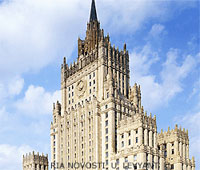RIA Novosti: Moscow Says NATO’s Freeze of Cooperation Reminiscent of Cold War

MOSCOW, April 2 (RIA Novosti) – NATO’s decision to suspend cooperation with Russia resembles Cold War-style sword swinging, a Russian Foreign Ministry spokesman said Wednesday.
The 28-nation NATO bloc announced Tuesday it will suspend all practical contacts with Moscow, in a move to put further pressure on Russia following its reunification with Crimea.
“The decision of the NATO Council of foreign ministers to suspend cooperation with Russia in the civilian and military spheres seems like déjà vu,” Alexander Lukashevich said, adding that “the language of the announcement is reminiscent of ‘sword swinging’ during the Cold War.”
The diplomat said the alliance had already frozen the work of the NATO-Russia Council (NRC) in 2008, in the wake of a brief war between Russia and Georgia over South Ossetia. Russia recognized the independence of South Ossetia and another breakaway Georgian region, Abkhazia, shortly after the war, prompting furious criticism from the West.
“How this ‘freezing’ ended, we all know. NATO returned to cooperation with Russia on its own initiative,” Lukashevich said.
NATO resumed cooperation after 10 months, announcing that the NRC should become an “all-weather forum” to discuss differences and cooperate in enhancing dialogue.
The diplomat said that neither Russia nor NATO countries win in halting mutual activities.
Speaking to journalists after the meeting Tuesday, NATO Secretary General Anders Fogh Rasmussen expressed hope that the suspension would not affect Russia’s participation in joint international projects in Afghanistan, such as anti-drug efforts.
He reiterated the importance of Russia’s maintenance of helicopters for the Afghan air force and the Russian transit route for deliveries of cargo to and from Afghanistan.
Foreign ministers will review NATO’s relations with Russia at their next meeting in June.
Tensions between Russia and the West rose after the ouster of pro-Kremlin Ukrainian President Viktor Yanukovych in February, followed by the rise to power of Ukrainian nationalist politicans in the new government in Kiev, which Moscow considers illegitimate.
The subsequent reunification of Crimea with Russia, sparked by deepening concerns over ultranationalist rhetoric from the new authorities in Kiev, triggered the deepest crisis in relations between Moscow and the West since the end of Cold War.
